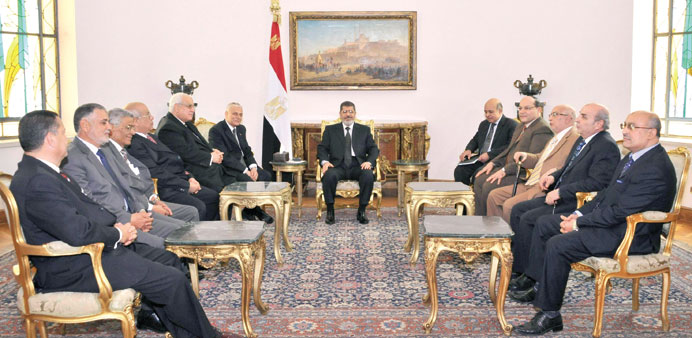Mursi meets with the Supreme Judicial Council and the prosecutor general at El-Thadiya presidential palace in Cairo yesterday.
Reuters/Cairo
Egyptian President Mohamed Mursi held crisis talks with the country’s top judges yesterday after the justice minister resigned over demands by the ruling Muslim Brotherhood for a “purification” of the judiciary.
The secular, liberal and left-wing opposition denounced what it called a planned “Brotherhoodisation” of the judiciary and called for demonstrations outside parliament.
A presidential source said Mursi met the Supreme Judicial Council and the prosecutor general to discuss a draft law reforming the judiciary due to go through the Islamist-dominated upper house tomorrow.
Justice Minister Ahmed Mekky tendered his resignation on Saturday following a protest by Mursi’s Islamist backers to demand that judges appointed during ousted former president Hosni Mubarak’s nearly 30-year rule be purged.
A key provision of the draft proposed by the Brotherhood’s Freedom and Justice Party would lower the mandatory retirement age for judges to 60 from 70, forcing hundreds of members of the judiciary to step down immediately.
Critics say it would eliminate more than 3,000 judges at a stroke, including most members of senior bodies such as the constitutional court which has repeatedly stymied Mursi’s legislative and election plans.
Leaders of the opposition National Salvation Front called for demonstrations outside the Shura Council (upper house) tomorrow to protest against what one senior liberal politician, Mohamed ElBaradei, called “the judges’ massacre”.
“The true goal of this project is to ‘Brotherhoodise’ the judiciary and replace independent judges with Brotherhood elements,” the umbrella group said in a statement.
Supporters of the bill, angered by the acquittal or release of some former Mubarak-era officials charged with corruption or abuses of power, deny that such a large number would be forced out but acknowledged it would remove at least 300 top judges seen as remnants of the former regime.
Mursi and the judiciary council also discussed the status of prosecutor general Talaat Ibrahim, accused by the opposition of Islamist bias, who is under pressure to quit after an appeals court ruled that his appointment by Mursi last year was illegal.
The presidential source declined to give details until decisions were taken. Asked whether Ibrahim would be offered an alternative position, the source said: “Could be but not sure.”
The courts have repeatedly intervened to change the course of events since the 2011 uprising that toppled Mubarak.
Prosecutor suspended for ordering 80 lashes
Egypt’s attorney general has suspended a prosecutor after he ordered the flogging of a man arrested for drinking alcohol, a spokesman said yesterday. The prosecution suspended Hussein Anani and opened an investigation, overturning his decision to condemn the man to 80 lashes, said prosecution spokesman Mahmud el-Hifnawy. Apart from ordering the man to be flogged, Anani instructed police in the southern province of Mina to carry out the punishment based on Shariah law. “The prosecutor (Anani) made two mistakes, pronouncing a punishment not mentioned in the law and then forcing the police to enforce it,” said a judicial source. Under Egypt’s constitution “the principles of Islamic Shariah are the main source of legislation.” The law does not mention flogging as a possible punishment.

